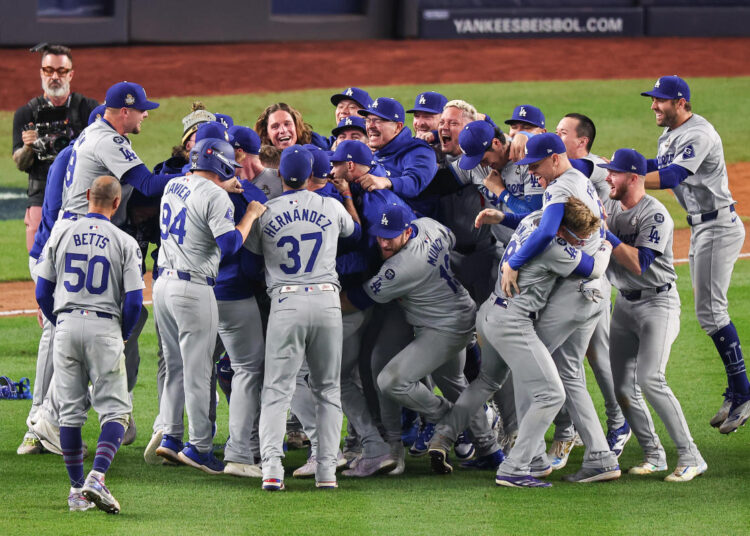NEW YORK — Never before has a World Series mattered to so many people.
As ribbons of gold shimmered down upon the champion Los Angeles Dodgers, the joy of it all reverberated far, far beyond the makeshift stage hastily assembled in the Yankee Stadium outfield.
In the audience below the celebratory platform, tears spilled free and easy down the proud faces of loved ones decked out in blue. In the stands behind the visiting dugout, scores of traveling fans like the ones who followed this team on the road all season serenaded the strangers whom they do not know yet care about so deeply.
Back in Los Angeles: fireworks in the streets, an illuminated blue D in the Hollywood sign, a symphony of car horns and more flowers laid outside Chavez Ravine in honor of Fernando Valenzuela. Friday, which would have been Valenzuela’s 64th birthday, will feature that long dreamed of parade. And across the Pacific, at a lunchtime watch party at Shohei Ohtani’s high school, students stood and cheered, banging together thunder sticks in honor of their most famous alumni.
The scale and scope of this title, which the Dodgers secured with a preposterous 7-6 comeback victory on Wednesday in Game 5, cannot be overstated. This organization is a behemoth, a monstrosity, imposing in both size and strength. The Dodgers boast resources few other teams can match, as evidenced by their outrageous spending spree last winter, when they committed more than $1.15 billion to Ohtani plus a pair of right-handed hurlers, Yoshinobu Yamamoto and Tyler Glasnow.
Yet for most of the past decade, the Dodgers have dominated during the summers and disappointed during the autumns. Only in 2020, during the bizarre, COVID-shortened season, did this organization finish the year with a trophy. Despite that title, their financial might, their developmental acumen, their endless horizon of talent and their 12 straight trips to the playoffs, the Dodgers still felt like a club operating beneath their ceiling. Always tantalizingly close, always victim to the roulette wheel of October.
Which is why this title meant so much to a team that spent so much, worked so much, planned so much and dreamed so much about this exact moment.
“We understand this is really hard to do,” pitcher Evan Phillips told Yahoo Sports. “I think that’s why you see us really cherishing the moment tonight and seeing how deep the celebration can run — because we know how special it is.
“And so much goes into it. There’s people here tonight I’ve never met.”
Phillips, a key member of the Dodgers’ bullpen for the past three seasons, did not pitch in this Fall Classic. An arm injury suffered during the NLCS forced him into the position of well-informed fan, one living vicariously through the men he spent the past eight months with. But being a spectator did not dampen the experience; Phillips’ journey from twice-discarded also-ran to shutdown reliever is a perfect encapsulation of how the Dodgers identify, develop and empower players into their best selves. Phillips couldn’t even list all the people within the organization he wanted to thank.
One of the people he did remember to mention, Walker Buehler, soon emerged from the clubhouse shirtless and shoeless, his pants sogged in champagne. The World Series hero shivered in the evening air as his wife, McKenzie, shielded him under her leather jacket. In his god-touched right hand, three gatorade cups of beer, stacked on top of one another. Another can of suds, unopened, jutted out from his right rear pocket. Buehler, the Game 3 starting pitcher who recorded the final out of Game 5 in a surprise relief outing for the ages, was thoroughly enjoying the good times. Understandable, considering the arduous road he traveled to reach this point.
Elsewhere on the field, cutting through the madness went Shohei Ohtani, the most talented baseball player the world has ever known. On each side of his comically broad frame, a security guard followed in perfect lockstep. Behind Ohtani trailed his omnipresent shadow, an army of cameras and flashbulbs documenting his every move to millions of adoring fans around the U.S. and across the Pacific. The Taylor Swift of Japan floated above it all, moving past throngs of onlookers before ducking into the clubhouse to raise that golden trophy for the first time.
As the Dodgers’ leading man disappeared out of sight, the least heralded player on the active roster strolled the scene solo, scanning the crowd for his wheelchair-bound father. Brent Honeywell Jr., whose once-promising starting pitching career was derailed by an avalanche of arm injuries, joined the Dodgers in July as a reliever on a flier. He brought with him a screwball, enough f*** you to fill Yankee Stadium and the experiences of a man who’d seen the bottom and crawled out.
His role in these playoffs was ugly, though undeniably important: Throw the garbage-time innings so the high-leverage relievers didn’t need to. That meant in Game 4, the only game of this Fall Classic that the Dodgers dropped, Honeywell set a record for the most pitches ever thrown in a single postseason inning (50) as the Yankees bludgeoned him for five runs.
But none of that failure, recent or historic, hovered over the permed-out pitcher as he locked eyes with his father. There, on the Yankee Stadium turf, Brent Sr., a former minor-league pitcher himself, stood tall — supported on one side by his wife and on the other by his best friend — allowing the two Honeywells the opportunity for a long embrace. The two men cried in each other’s arms, the wheelchair temporarily vacant, both of them thoroughly understanding the pain and patience behind that beautiful moment of total gratification.
It was a moment that belonged to every Dodger in the building, from those whose contributions came in plain sight, like World Series MVP Freddie Freeman and now three-time champion Mookie Betts; to the unsung heroes, like Honeywell; to those who didn’t get to play at all, like Phillips; to those who came up huge when it mattered, like Buehler; to those who helped build the behemoth that is these Dodgers, like veteran starter Clayton Kershaw, manager Dave Roberts and president of baseball operations Andrew Friedman.
At one point in the postgame madness, outfielder Teoscar Hernández, whose crucial, two-strike double in the fifth tied the game, navigated the crowd with his 2-year old son in his arms. The wide-eyed youngster, only partially comprehending the moment, looked up at his dad and asked a very simple question.
“No more baseball?”
For this year, yes, no more baseball. But for the first time for Hernández, Honeywell, Phillips, Ohtani and a whole host of other Dodgers, that sobering reality of the end of a season is a good and glorious thing.
It’s a thing they’ll celebrate forever, with the hundreds and thousands and millions of Dodgers all around the globe.
Read the full article here



























Discussion about this post